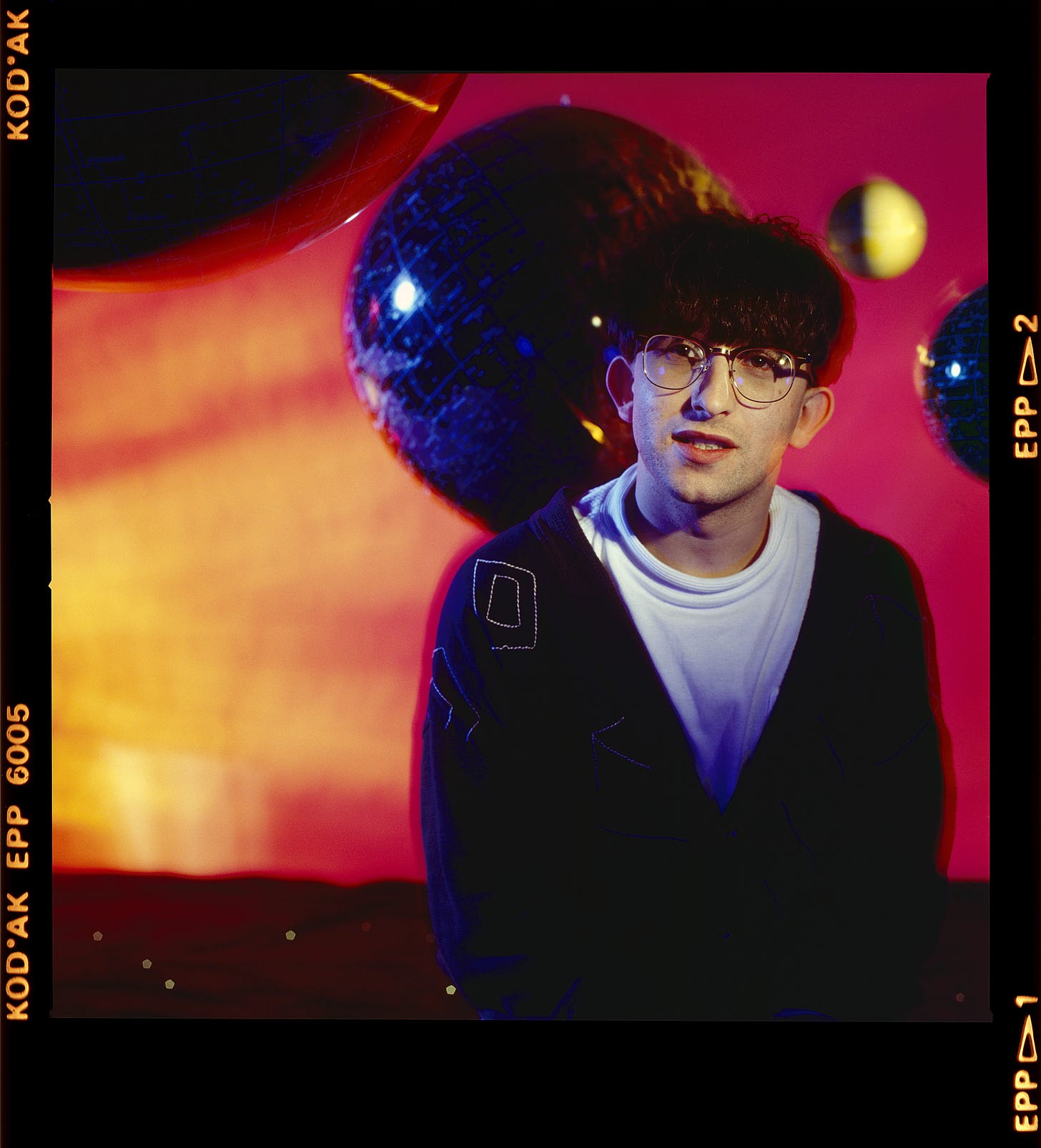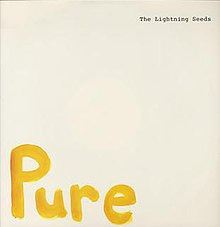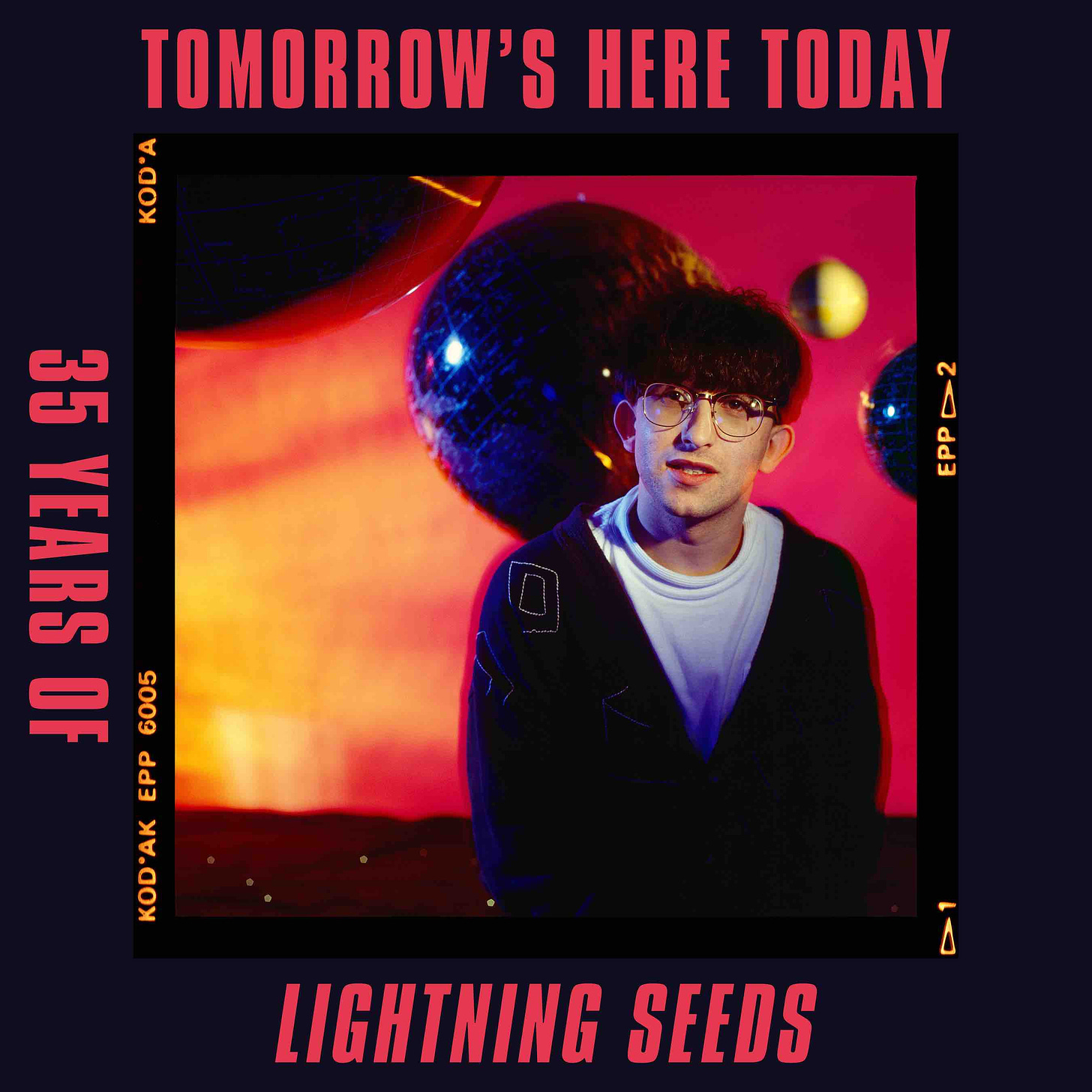The New Cue #341 December 4: Lightning Seeds
"I look back and realise I took what was a real fucking leap of faith"
Good morning,
Welcome to your weekly free edition of The New Cue. This week, we’ve got Lightning Seeds leader Ian Broudie telling us the tale of the band’s breakthrough early hit Pure. Oh lucky you, it’s a free edition – spread it far and wide.
We’ll see you on Friday for some Recommender action. Enjoy the edition,
Ted, Niall and Chris
Start The Week With… A Story Behind The Song with Ian Broudie
Last month, the Lightning Seeds announced a tour to mark the 35th anniversary of Ian Broudie’s indie-pop titans. You can get tickets for the dates, which run through November and December 2024 and will be preceded by a new Greatest Hits set, here. The shows promise to be a celebratory affair, saluting Broudie’s decision to walk away from a successful career as a producer in favour of writing and recording his own songs in 1989. He triumphed from the off - his first ever track was a jubilant guitar-pop song called Pure that became a huge sleeper hit. Broudie’s way with an uplifting pop hook, rousing anthems with a sort of breezy melancholia streaked through them, didn’t let up for the next decade. After Pure came indelible numbers such as The Life Of Riley, Change, Lucky You, Three Lions and more, songs that helped make the Lightning Seeds become one of the most successful groups of the 90s. They went on to sell over eight million albums and Broudie looked back over his career for a recent memoir titled, like the forthcoming new Best Of, Tomorrow’s Here Today. Recently, Ian spoke to Niall on Zoom for a bumper Story Behind The Song for Pure, a crucial breakthrough for the formative Lightning Seeds.
Pure by The Lightning Seeds, 1989
Hello Ian, how are you?
I’m OK, just a little been all over the place with book things so a bit tired, but all good, trying to write, get ready for this Madness tour. Just loads going on. What about you, all good?
Yeah, all fine with me cheers. The book is great, did you learn anything about yourself writing it?
I think because it’s not an autobiography, it’s kind of stories, it was going to be just purely anecdotal and then loads of me went in it and I thought ‘well, it’s not anecdotal’ and that was surprising. What it did for me looking at it, it linked everything up and put it in perspective in a funny way. I was like, ‘OK yeah, I can see why that led to that and why I did that’. I always think I just blundered around but I realised there was a bit of sanity in it.
We’re going to do a Story Behind The Song on Pure, which is a massive track for you – it’s the song that started everything isn’t it?
It was like a miracle. When I was a little kid, I was obsessed with music to the point where people were worried about it. I was so in awe of Echo And The Bunnymen, who were my mates, that when I produced them it was great for me because it was the closest thing to being in the group with them, I was sort of in the group with them for that period. I always wanted to do my own thing but that knocked me off-course to a degree, on a really nice off-course, which was producing people which obviously then really helped in millions of ways but was still a kind of off-course thing. I had a blossoming career as a producer and I didn’t want to be a producer, I never wanted to be a producer, it doesn’t really interest me at all. These days, if someone says to me, ‘do you fancy producing the record?’, I’m very lukewarm about it, but if someone says to me ‘fancy collaborating on some music?’, I’m right up for it and I never knew that until I wrote the book. Or maybe I did, but I feel like I really know that now. I love working with different people, I love being in the studio. I’m bit uncomfortable and everything in real life but when I’m in the studio, I really feel like I that’s my natural habitat. It’s where I just know what I want to do and feel physically what it is.
Recording Pure, you’d been producing and then you some studio time for yourself. How long had that song been in your head?
What I think about Pure is, it’s the power of the unfinished song. I think when you write songs, they have this possibility to be all these things, you’re like, ‘I think it could be a bit Motown-y’, or ‘it’s like Sinatra’, you’ve got all these things that it’ll be. And just by the nature of it, when it becomes something, that’s a victory and a defeat. It’s totally bittersweet, like, ‘It is that, but it’s not that or that, or that, which I was hoping it would be’. I try not to plan too much. I never have a song in my head before, it always comes as I do it. With Pure, it was my first attempt at writing everything and having to record everything because there was no group. I was in this position of, ‘I definitely want to be an artist, I haven’t got a group’, it’s pre-recording at home even though I did do it at home on the Portastudio and stuff, I’m in this position where, ‘How do I do this, do I just stop producing?’. I look back now and realise I took what was a real fucking leap of faith. It was like, ‘I’ve got to do this at some point.’ I had three or four songs and I was in the studio and I got Pure going and it needed something. I thought, ‘Maybe an arpeggio might be good’ and I got this little trumpet-y sound because I’d bought a sampler. It was like, ‘Muted trumpets, OK!’ or maybe the muted trombone, because I can’t get a trombone player. It was all very new then, sampling and everything, but it wasn’t machines so I had to play everything, I didn’t know how to programme things. So Pure is there and I’ve got the lyric sheet and when I’m producing, it’s usually four lines then three lines of a chorus that get repeated, then four lines. I’ve written out Pure, and I’m singing it and I’m like, ‘there’s tonnes and tonnes of words here, I’ve done this wrong, I’ve made a mistake here’. I said to the engineer, ‘I’ve blown this, let’s do the other three and forget this one’. It was up on the desk and he said, ‘Well, I really like it, I’ll put it down onto the DAT tape’. I was like, ‘Don’t bother, this is not happening.’
I finished these three songs – well, I thought I’d finished two, I didn’t really think about Pure. I’d been producing the Pale Fountains and I met this guy Dick Leahy, big cigar, 60s roguish guy, real character who’d worked at Phillips Records and was a publisher. He said to me, ‘What are you doing here, do you ever do any songs of your own? If you ever do, send them to me’. I’m sitting there with the songs and I’ve no idea what to do and I sent them to him, then I got this call. He was a right character, he said to me, ‘I’m sitting in my backyard, the sun is shining, got a glass of Chablis and I’m listening to your song. Fantastic. Love it.’ I said, ‘Oh great.’ He said, ‘yeah, Pure’. I went, ‘No, no, no, was that on the tape? It’s the other two, Pure’s not even finished, I’ll finish it’ and he was like, ‘Don’t touch it, I’ll put it out, I’ll press up a few hundred and we’ll put them in Rough Trade’ and I’ll get someone to take it to the radio. It was a very inauspicious start. Everyone else in Liverpool, like The La’s, were signing massive contracts, the Pale Fountains had signed to Virgin for millions of pounds...
What were the other first reactions about the song like?
Well, I hadn’t really played that one to people because for me that wasn’t one of the three. When it comes on the radio and I hear it now and it goes ‘bah, bah bah’ and the guitar’s going ‘ding ding ding’, that’s all me getting ready to start, trying to get in time and the ‘ding, ding ding’ is checking the tuning. I would have cut all that off, that would not be on the record, I would’ve top and tailed it so I would’ve ruined it straight away. It wouldn’t have had that intro, it would have just started like a Motown record, that was the plan. I would’ve ruined it. Pure has got this thing where I’ve got no career, I’ve got no band, I don’t want to be the singer. I’m in Liverpool, I haven’t finished the song, haven’t mixed it, I have no record company, I can’t play live and I’ve got this eccentric 60s guy who is a little bit out of touch getting a bloke to take it to a couple of radio stations. I wasn’t packing the bags for Hollywood, as it were. It was like, ‘Okay, what have I got to lose?’.
Pure shouldn’t have managed to do what it did. It hung around and they’d phone me up after a few weeks and say ‘It’s 142 in the charts’, and I’d go ‘Oh great’. Then the next week it’s 148, then it’s 138, then a bloke in Stoke-on-Trent is playing it, it’s doing all this. Then John Peel plays it and it’s not going away, which is odd. Then it’s like, ‘Oh we sold all 200, we’ll have more pressed up’. Then I get this news from the plugger that Steve Wright In The Afternoon, which is the biggest show on radio, the producer really liked it and we’re gonna get a play on Steve Wright In The Afternoon. I was like, ‘Wow, this is fucking big news’.
We’re in the kitchen, got the radio on, waiting for it all, and this is the track that I just didn’t think I’d done properly and it’s going to be on the radio. Sure enough, Pure comes on and it gets to about halfway through and he takes it off. I’m like, ‘Oh my god, I knew it wasn’t finished, I knew it wasn’t up to the standard, he literally thinks it’s that bad he’s taken it off’. I was devastated. And then he goes, ‘Who is this? The Lightning Seeds, I’ve never heard of them, this is fantastic! I’m gonna play it again from the beginning’. So he plays it again, and then he goes, ‘I’m gonna play it again’ and he played it again, which never happened.
How instantly did everything ramp up after that moment?
It ramped up to the point where we only had a few hundred records and they sold out so we couldn’t go in the charts. There’s no infrastructure but it got on radio. That was the moment when they started playing it on the radio. I don’t think it had very good reviews or anything like that, I don’t remember anyone going, ‘This is great!’. It was more like, ‘Who is this? What is this?’. We did a little video, me sitting on a stool, and that got on Top Of The Pops. Then they ran out of records again. It changed my life. It validated me. I still didn’t think I was a singer and I was looking for a singer way after that, even on the second album, I was desperately trying to find a girl to be the lead singer. I just really never saw myself as a singer.
I got this call from America. I was in Liverpool and the phone went and it was this guy on a station called KROQ in Los Angeles and he was like, ‘Is this Ian Broudie? You’re live on air!’. I’m like, ‘Who is this?’. And then he goes, ‘You’re the most requested song in California!’. I was like, ‘It’s not out in America, bullshit,’ and he said, ‘That’s the whole thing, I was in Portobello Market by Rough Trade, they played it in the shop, I took five copies back to America and I’ve been playing it and the other stations picked up on it, no one can buy it so they have to request it on the radio.’
That’s brilliant.
Yeah, it went out in the world, this song that I didn’t finish. And it is that thing of, ‘the guy who never made it is a genius’ or ‘the song you never heard’, that whole mythology that we all do where someone says to you, ‘There’s this bloke from Bolton in the 60s and we’ve just found his tape, it’s genius!’. I think that is the power of the unfinished song.
What goes through your head when you play Pure today?
I love playing it. I don’t think I’ve ever written a better song, even though I probably didn’t write it in the end because I never finished it, didn’t get a chance to ruin it, ‘Get rid of that Pure bit!’. I’ve played it at every gig I’ve ever done. I love playing on the acoustic, it works for me better on the acoustic than the record. It’s the miracle for me, it changed everything and took me away from being a producer into being an artist. Although, as usual in my life, everything’s backwards - when I’m 18 I’m producing the Bunnymen, when I’m 31 I’ve got a single in the charts, no band. When I eventually play live on the third album, trying to sing in public, everyone else gets to play in a bar for two years but I’ve got to play to 2000 people and try and sing. I’m just about in tune now, it’s taken about 20 years.
People have said to me about the book, ‘There’s all these photos of you with Pete Burns and Holly Johnson and you’re this little bloke in the middle of it, the least likely to’. And Pure is a bit like that. I remember early on, someone said to me, ‘I was in Manchester the other night and they played Pure at the Hacienda, amidst ‘Cos you ride on time!’, they played Pure. I think it was the opposite of everything. I hear it on the radio now and I always think, ‘it still sounds really good’, probably because it wasn’t finished. Because I went off on this path on the outside lane, the songs don’t sound like anything from that time yet they’re of that time. Like that photo of Big In Japan, what are you doing in that photo like fucking Zelig or something? But somehow it’s the glue that glued it all together.
ND






